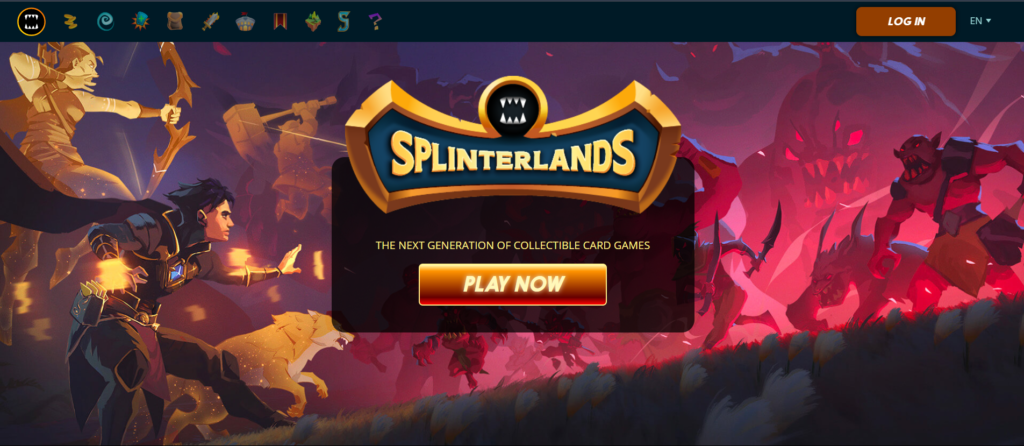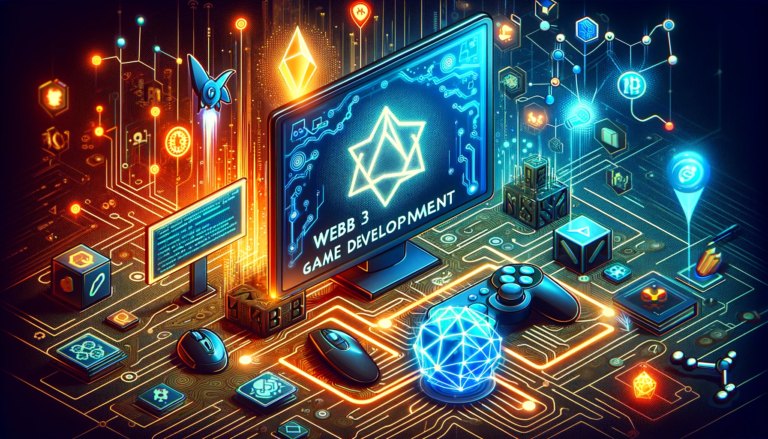Exploring the Frontier: The Rise of Web3 Gaming in 2024
In the rapidly evolving digital landscape, the rise of Web3 gaming is heralding a new era in the gaming industry. As we approach 2024, top Web3 game development projects are poised to redefine what we know about interactive entertainment, leveraging blockchain technology to create immersive and decentralized gaming experiences.
The concept of Web3 game development extends far beyond traditional gaming paradigms. It's not just about playing; it's about being part of an ecosystem where players have real ownership, governance, and earning potential. This shift is driven by blockchain technology, enabling transparent and secure transactions, as well as the introduction of non-fungible tokens (NFTs), which offer players true ownership of in-game assets.
One of the most exciting aspects of top Web3 game development is the empowerment of players. Unlike traditional games where value and control rest solely with developers and publishers, Web3 games distribute power among the players. This means players can have a say in game development decisions, trade assets freely, and even earn cryptocurrency through their in-game activities.
Moreover, the integration of decentralized finance (DeFi) elements into gaming is opening up new avenues for financial inclusion and literacy. Players can engage in staking, yield farming, and other DeFi activities, making the gaming experience not just fun but also financially rewarding.
As we delve deeper into 2024, the rise of Web3 gaming is set to accelerate. With an increasing number of developers jumping onto the blockchain bandwagon, we're witnessing the birth of games that are not only technologically advanced but also offer a level of interactivity and player agency that was previously unimaginable.
In summary, the top Web3 game development projects of 2024 represent more than just a technological leap; they symbolize a paradigm shift in the gaming industry. As players become stakeholders and creators in their virtual worlds, the potential of gaming is being reimagined, making the rise of Web3 gaming a trend that is not just fascinating but also revolutionary.
LandRocker: A Breakthrough in Web3 Game Development
LandRocker is emerging as a standout in the top Web3 game development arena, particularly with its unique approach to gameplay and its use of blockchain technology. This Play-to-Earn game, centered around discovery and space exploration, takes players on an intergalactic journey, offering a mix of adventure and strategy. As you embark on mining missions in the vastness of space, you collect a range of rewards including NFTs, crypto tokens, and crafting materials, which can then be crafted into your own NFTs and traded on the marketplace.

Sustainable Ecosystem
What sets LandRocker apart is its solution to two critical issues in the gaming world: inflation and trust. By harmonizing the Play-to-Earn and Play-to-Win models, it ensures a balanced gaming economy and stable player revenue. This approach creates a dynamic and lasting ecosystem, where materials and blueprints mined in the game become critical assets, enhancing both the gaming experience and the in-game economy.
Gameplay and Mechanics
The game's mechanics are designed to captivate players from diverse backgrounds, combining exploration, strategy, and rewards. Players explore unknown planets, overcoming obstacles and collecting valuable rewards. The core of the gameplay revolves around the player's Rover, with the strength of the Rover determining the speed of mining rewards. Fuel is another crucial element, enabling players to explore planets and collect resources. The game offers two versions: a Pro version with a range of gameplay modes, and a Lite version for quick and simple mining.
Blockchain Transparency
LandRocker's use of blockchain technology sets a new standard for transparency in gaming. It employs Smart Contracts to cryptographically secure reward locations, ensuring unpredictability and fairness in reward distribution. This system guarantees that even the platform's developers cannot predict the location of rewards, fostering complete trust and transparency.
Rovers, Materials, and Crafting
The game features basic and NFT-based Rovers, with the latter providing increased mining power. Players can craft Rovers and Planets using materials and blueprints, which can then be sold on the marketplace. Planet owners earn a share of the profit from the Fuel sales paid by other players to mine the planet.
Tokenomics: The LRT Token
The LRT token is central to the LandRocker ecosystem. It functions as the primary governance and utility token, used for purchasing in-game items, staking mechanisms, buying NFTs and Fuel, and as prizes in Treasure Hunt Universes.
Earning Potential
Players can earn in various ways:
- Mining rewards by purchasing Fuel and collecting NFTs, crypto, materials, and blueprints.
- Crafting and selling valuable NFTs on the Marketplace.
- Earning revenue share from owned Planets, staking LRT for Fuel, and participating in the Liquidity Pool.
Accessibility and Future Enhancements
LandRocker is accessible through a Lite version on its website, with a Pro version offering more control and exciting gameplay modes set to launch in 2024.
The Team Behind LandRocker
Developed by INFINITE8, a company with two decades of expertise in IT, Gaming, and Deeptech, LandRocker is backed by a team of blockchain and gaming experts committed to delivering a high-quality gaming experience and continuous innovation.
In summary, LandRocker represents the future of Web3 game development, integrating advanced blockchain technology, innovative game mechanics, and sustainable economic models. Its transparent and fair reward system, coupled with its engaging gameplay, positions it as a promising contender in the top Web3 game development projects, poised for significant growth and success in the coming years.
The Sandbox: A Paradigm in Web3 Game Development
The Sandbox, originally a mobile game, has evolved into one of the leading metaverse platforms, reshaping the Web3 game development sector with its innovative technology and collaborative events. As a decentralized, user-generated, open-world game, it offers players the freedom to build, own, and monetize their experiences using non-fungible tokens (NFTs) and its utility token, SAND.

The Role of SAND in The Sandbox Ecosystem
SAND is the official cryptocurrency of The Sandbox. As an ERC-20 token built on the Ethereum blockchain, it powers everything within the metaverse, serving as a medium of exchange, enabling asset trading, staking, governance, and earning rewards. With a finite supply of three billion tokens and a significant market capitalization, SAND is a cornerstone of the Sandbox economy.
LAND: The Digital Real Estate of The Sandbox
In The Sandbox, players can own digital plots called LAND, represented by Ethereum or Polygon NFTs. Each LAND parcel offers a unique space in the metaverse where owners can host interactive experiences, games, and events. Notably, LAND owners can also rent out their digital real estate to other creators, adding a layer of economic activity within the game.
ESTATEs and ASSETs: Expanding the Creative Possibilities
For those seeking larger spaces, The Sandbox offers ESTATEs, combinations of multiple LANDs, to accommodate more extensive gaming experiences. Additionally, the game features ASSETs - 3D playable objects that players can create using VoxEdit, the platform's voxel editing tool. These ASSETs can be traded on The Sandbox's NFT marketplace, enabling players to monetize their creativity.
Partnerships and Events: Driving Engagement
The Sandbox boasts over 700 global partners, including governments, corporations, and celebrities, contributing to its diverse metaverse ecosystem. Its array of events, like the Alpha Summer Season, offers unique gameplay experiences and play-to-earn opportunities, attracting a wide audience and solidifying its position as a top metaverse platform.
VoxEdit and Game Maker: Tools for Creativity
At the heart of The Sandbox's creator experience is VoxEdit, a 3D voxel modeling and NFT platform that empowers users to create and animate 3D objects. The Sandbox Game Maker, another key feature, is a user-friendly game engine that allows developers to build experiences without the need for coding, further democratizing game creation within the metaverse.
Monetization Opportunities for Creators
The Sandbox provides various avenues for creators to earn, such as creating and selling ASSETs as NFTs, building and monetizing games and experiences, and leveraging LAND for rental or content hosting. These features create a dynamic and economically viable environment for both gamers and creators.
Roadmap and Future Prospects
Looking ahead, The Sandbox aims to expand its business and partnerships, enhance its Game Maker tool, and conduct more LAND sales, continuing its growth and innovation in the Web3 space.
In summary, The Sandbox represents a comprehensive and advanced example of Web3 game development, with a focus on user-generated content, creative freedom, and economic empowerment. Its combination of technological innovation, community engagement, and expansive partnerships makes it a flagship project in the Web3 game development world, poised for continued success and growth.
Splinterlands: Revolutionizing Blockchain Gaming
Splinterlands, launched in mid-2018, is a trailblazer in the blockchain gaming world, particularly known for its innovative fusion of deck-building strategy and quick-fire battles. As a pioneering NFT play-to-earn (P2E) trading card game, it stands out for empowering players with true ownership of their digital cards, unlike traditional titles. This empowerment is facilitated by Web 3.0 technology and the HIVE blockchain, making every card a non-fungible token (NFT) owned by the player. This model allows players to battle for rewards, hold cards as collectibles, trade on peer-to-peer markets, level up by combining cards, or even burn them for in-game currency, Dark Energy Crystals (DEC).

Gameplay Dynamics
Splinterlands is recognized for its fast-paced and strategically rich gameplay. It diverges from traditional turn-based trading card games like Magic: The Gathering, with each match in Splinterlands taking only 2-3 minutes. The game’s main mechanic revolves around a drafting style. Players assemble a team of up to six cards from their collection and engage in automatic, quick, action-packed battles based on a unique set of rules, making every match distinct and engaging.
Global Appeal and Market
The game enjoys a vast and loyal following in the P2E industry, translated into nearly a dozen languages and played in over 100 countries. The thriving Splinterlands community actively engages in trading thousands of cards daily, contributing to a dynamic peer-to-peer monster market. This global appeal underscores the game's success in not only attracting players but also in maintaining an active and engaged user base.
Roadmap and Future Developments
The Splinterlands roadmap points to continuous innovation and enhancement of the game. Key features planned for 2023 include the introduction of DEC batteries for storing excess earnings, season-long card rentals on the marketplace, group card editions by set for easier browsing, and the internal testing of SPS validator nodes to test network governance. These developments indicate a forward-thinking approach to both gameplay enhancement and community engagement.
The Splinterlands Map and Land Expansion
An exciting development for Splinterlands is the upcoming "The Secret of Praetoria" map expansion. This addition will make the game's land dimension, which has been eagerly anticipated by players, usable. The expansion includes 150 player-owned regions containing resource-rich, variably rare plots, adding a new layer of depth and complexity to the game. This expansion is expected to revitalize Splinterlands' position in the Web3 gaming arena.
Tokenomics: Splintershards (SPS)
Splintershards (SPS) is the primary payment and governance token within Splinterlands. It allows stakeholders, asset owners, and players to have decision-making control and influence. While the price of SPS has been volatile, it highlights the potential for growth and the speculative nature of tokens within active blockchain games. For investors, SPS offers a mix of governance utility and speculative upside, though with inherent risks.
In summary, Splinterlands is not just a game; it's a comprehensive ecosystem that blends strategic gameplay with the economic opportunities of blockchain technology. Its global reach, continuous development, and innovative use of NFTs and tokens make it a standout project in the Web3 gaming world, offering both gaming excitement and potential economic benefits to its players.
How do you develop a Web3 game?
Web3 game development involves using a stack of tools and technologies to create and manage games on blockchain networks. This includes everything from underlying smart contracts to user-facing elements like Web2 logins.
What is Web3 gaming?
Web3 gaming represents a shift towards a more decentralized web. It utilizes decentralization to ensure that no single entity, including the game’s developers, is a central authority. Players have complete ownership and control over their in-game assets, which they can trade for other assets or fiat money.
What are the challenges of Web3 game development?
The major challenges in Web3 game development include designing for open economies, scalability issues, and managing game economy inflation. These challenges require developers to think innovatively and consider the unique aspects of blockchain technology.
How does blockchain technology impact Web3 games?
Blockchain technology in Web3 game development serves as a public database, tracking and recording every transaction and change in ledgers. It introduces play-to-earn logic, allowing players to win and trade assets and earn cryptocurrencies while playing.
What is the role of NFTs in Web3 gaming?
NFTs enable true ownership of in-game assets and tokens in Web3 gaming. Players can own assets on one gaming platform and transfer them to another, thanks to the interoperability offered by blockchain technology.
How is user onboarding managed in Web3 games?
User onboarding in Web3 games is complex, involving wallet creation, seedphrase management, and in-game logins. Simplified logins and sign-ups are crucial to bridge the gap between traditional and blockchain gaming.
What are the payment mechanisms in Web3 games?
Web3 gaming payments extend beyond using cryptocurrencies for in-game purchases. They encompass a broader range of transactions and in-game financial activities.
How important is session management in Web3 games?
Session management is vital in Web3 games for ensuring smooth interactions and transactions for players. It relies on blockchain for security and transparency, differing from traditional games where session data might be centralized.
What is the significance of crypto off-ramp in Web3 games?
Crypto off-ramps in Web3 games act as gateways for players to convert their in-game value to real-world assets. They facilitate the seamless liquidation of assets, enabling players to benefit from their in-game achievements.
What about performance and scalability in Web3 games?
Performance and scalability are critical concerns in Web3 games, given the current infrastructure limitations. However, advancements in blockchain technology are addressing these issues.
What role do APIs and gaming SDKs play in Web3 games?
APIs and gaming SDKs are crucial in Web3 gaming, largely due to the open-source nature of development, which fosters innovation and accessibility.
Which blockchains are suitable for building Web3 games?
The choice of blockchain is fundamental in the Web3 game development ecosystem. Blockchains in Web3 games mirror the role of servers and databases in Web2 games, capturing a gamer's activity and gameplay status




